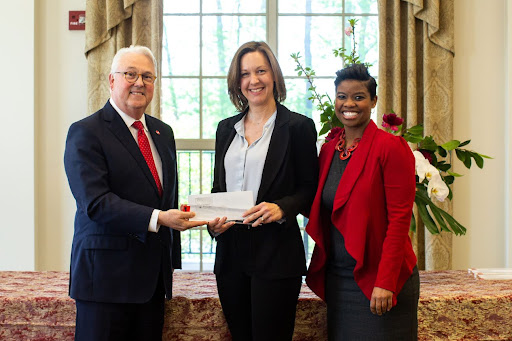Meet DELTA Faculty Fellow Anna Gibson
Finding the Keys for Student Success

Assistant Teaching Professor and DELTA Faculty Fellow Anna Gibson is no stranger to working together with DELTA to create impactful learning experiences for her students. Previously, Gibson has worked with DELTA on two separate grants and found those experiences valuable opportunities to participate with colleagues from other disciplines.
“Often, we can become siloed in our own departments and colleges,” Gibson said. “My experiences with DELTA have allowed me to work with folks across campus. Last year, for instance, I collaborated with Justin Post in the Department of Statistics to put together an interdisciplinary panel about ChatGPT for the Conference on Faculty Excellence.”
As a DELTA Faculty Fellow, Gibson anticipates continuing these types of collaborative efforts to find new ways to challenge her students and their ideas using creative assignments and learning activities. Gibson began her journey at NC State in 2018 and regularly teaches online sections of ENG 262: English Literature II. In addition to teaching courses in British literature, she is the coordinator of HSS 120: Introduction to Humanities & Social Sciences, a first-semester course for College of Humanities and Social Sciences (CHASS) students. Gibson is also a member of NC State’s Academy of Outstanding Teachers, having won both the 2023 NC State Outstanding Teacher Award and the 2023 Alumni Association Outstanding Teacher Award.

Teaching Methodologies
When the pandemic forced in-person courses to be taught online, many NC State faculty and staff searched for meaningful ways to engage those students learning virtually. Gibson wanted a way to incorporate interactive pedagogical methods that are so essential in literature courses, where close reading and discussion-based, collaborative interrogation of a text’s meaning are critical to the learning process.
“In the literature classroom, we rarely think of ourselves as lecturers delivering content,” Gibson said.
We want our students to be co-creators of knowledge, to learn with us and with one another, and to be inspired by and think with the texts we’re reading.
In looking for purposeful ways to connect with her online students, Gibson discovered tools and solutions using social annotation technologies, such as Perusall.
“Initially, I was reluctant to teach a literature course online because the in-class environment is difficult to replicate in a virtual space,” Gibson said. “But I found that social annotation assignments allowed me to recreate some of that experience while also adding a new dimension: a type of discussion deeply rooted in the text itself. Perusall was one important component of my instructional technology.”
Gibson also found help through a DELTA Course Improvement Grant.
“Using the DELTA Course Improvement Grant, I redesigned ENG 262 to make it more user-friendly,” Gibson said. “The redesigned course helps students understand why they are doing each learning activity, and it helps me keep track of every student’s progress towards the overall learning objectives.”
Goals
Gibson is looking forward to her upcoming work with the Faculty Fellows program and has multi-faceted goals.
First, she hopes to enhance student learning and participation with social annotation tools, especially Perusall. She is excited about ways that these tools can encourage students to engage with each other in significant ways, which becomes more critical during online learning. Ultimately, Gibson understands the importance of the discussion-based model for learning in her courses and appreciates what these tools bring to the table.
“I’m an enthusiastic advocate of annotation tools and the methods of interaction they facilitate, especially for courses in which engaging with texts is central,” Gibson explained. “Perusall encourages students to read actively, engage with a text in its margins, interact with it, analyze meaning, ask questions, and probe its ideas. I’ve used this tool (and other kinds of annotation assignments) in online and in-person, graduate and undergraduate, courses. As a Faculty Fellow, I’m interested in sharing my experiences with others, developing my own knowledge and engagement with social annotation tools, and producing some scholarship on the theoretical and practical applications of annotation.”
Next, as the coordinator of HSS 120, Gibson wants to ensure that first-semester CHASS students have the support they need to be successful. Gibson sees this course as an opportunity to foster a sense of belonging and identity for members of CHASS and to help students transition to college in ways that help them align their intellectual and educational interests with their personal goals and wellbeing.
HSS 120 introduces CHASS students to the college and to opportunities and resources across the college and university to prepare them for fulfilling and successful academic careers.
Within her coordinator role, Gibson is already partnering with DELTA to enhance the course and looks forward to expanding that work during her time as a Faculty Fellow.
“With the help of a 2023-2024 Wellness and Belonging Mini-Grant from CHASS, I’m working with DELTA to put together a new video for our Keys to College series, which focuses on Wellness and Mental Health,” Gibson said. “This video expands on a previous DELTA Grant project where we created a series of videos designed to help humanities and social science majors thrive at NC State. The goal of this new video is to demystify and destigmatize seeking support for mental health challenges. I’ve worked hard to redesign this course to help students have a meaningful and rewarding first-semester, and the Keys to College series is at the heart of this redesign. I think expanding the Keys to College series to more fully address mental health is essential. I’m so grateful to DELTA for making this possible!”
Interested in sharing your knowledge and learning from other instructors? Learn more about DELTA’s Faculty Fellow program and receive updates on the DELTA Grants cycle.


